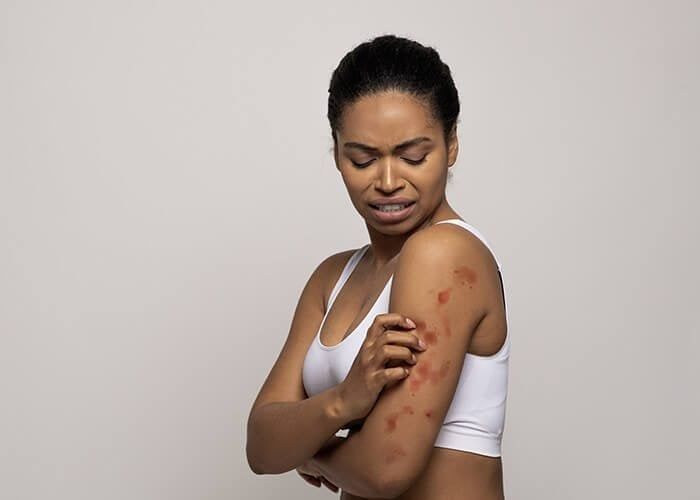

Dear Valued Client, We are thrilled to welcome you to the GlowMail - The Avané Edit, your go-to source for the latest in skincare, expert treatments, exclusive offers, and much more. At Avané Clinic, we seamlessly blend cutting-edge medical science with advanced aesthetics to help you look and feel your best. Under the expert guidance of Dr. Pranav Pancholi, a renowned cosmetic dermatologist, we are committed to providing personalized care that enhances your natural beauty and boosts your confidence.
Eczema is a common skin condition that causes patches of the skin to be itchy, red, dry, cracked, and irritated. There are different types of eczema, although most people use the word eczema when referring to atopic dermatitis, which is the most common form. It usually starts in childhood but at times, it may persist into adulthood. Research shows that about 15% -20% of children all over the world suffer from eczema with 1%- 3% of adults also being infected. If you live around Nairobi and may have noticed any one of these signs, you need not panic or worry. Avané clinic in Nairobi offers exclusive eczema treatment.
There are various types of eczema, which include:
Atopic refers to conditions that revolve around the immune system such as asthma and hay fever, while dermatitis refers to an inflammation of the skin. Atopic dermatitis hence is inflammations that are a result of the activity of the immune system. Researchers haven't discovered the exact cause of dermatitis, but it is believed to result from the immune system's response to irritation on the skin, or problems that allow germs in and let moisture out of the skin. It is genetic, running in the family just like other types of allergies. There are triggers that may flare up the itching and advance the condition. These include rough fabrics, soaps, detergents, foods such as nuts and dairy products, pollen, and certain fragrancies. It may also be caused by stress or depression. Dermatitis is not contagious, hence cannot be passed from an infected person to a healthy person. There is no cure for dermatitis but the symptoms can be managed and suppressed.
Dermatitis is usually mild and manageable but at times it may be severe, requiring intensive care. The symptoms of dermatitis vary according to age and severity, and from one individual to another. It usually starts with redness and itchiness and can affect any part of the skin, but is most common on the hands, neck, inner elbow, feet, ankles, knees, and around the eyes. The rashes are extremely itchy, but it is not harmful to the rest of the body.
Infants under two years develop rashes on the scalp and cheeks, which itch and at times, bubble up and release fluid from them. Children above 2 years, experience rashes behind the knees and elbows, neck, wrists, ankles, and creases on their bottom. The rashes may become darker or lighter and bumpy. They may also experience skin thickening, which later on develops into itches. In adults, the rashes may appear scalier than in children and usually appear on the knees, elbows, or nape of the neck. They also experience dry skin on the affected area, skin infections, and itchy, permanent rashes that cover most of the body.
Adults who suffered from dermatitis while they were young but no longer suffer from the condition may still have evidence of dry and easily irritable skin, hand dermatitis, and eyelid dermatitis. The appearance of the skin after the effects of dermatitis depends on how much the patient scratched when the skin was infected. Continuous scratching and rubbing usually cause more skin irritation and causes more inflammation.
If you noticed any one of these symptoms or feel insecure about those rashes you have been having, visit us at our Nairobi clinic, and our trustable team of physicians and doctors will take good care of you. To start with, you shall have to consult with our doctors, who will ask you questions about your medical and family history and any drugs you might have been using. The doctor will then examine your skin and if necessary, they may conduct a patch test to determine the allergen that triggers symptoms of the condition. The patch test is conducted by applying an allergen to a patch placed on your skin. The skin inflames and irritates if the allergen is a trigger for you.
As mentioned earlier, there is no known cure for the condition. If the doctor determines the condition, a series of treatments will be recommended to help manage the symptoms, so as to offer a more comfortable life by ensuring minimal itching and inflammations. The remedies may include:
The doctor also recommends a series of home care routines to help with the condition, such as using lukewarm water for showers, having a constant skin care routine, avoiding certain foods, exercises, reducing shower time, avoiding stress, having regular sleep routines, constant hydration, wearing loose clothes or therapy where possible.
Consulting with our specialists will help you determine if you really do have dermatitis and help you get a remedy to manage the symptoms. If not, we run other tests to identify what may be wrong with your skin and find a remedy for it. They are very knowledgeable and will help you gain lots of knowledge on the conditions, and as it said, knowledge is power. Moreover, we help you heal your skin and prevent flares that develop, leading to a more comfortable, confident life. We also help prevent infections that may attack the skin due to rashes.
At Avané clinic, we recognize how uncomfortable dermatitis may be, and the insecurities it wages on you. We are committed to help you fight the dermatitis, and gain your confident back. We are located at the Yaya centre in Nairobi and are open to all. Visit us today and you can be assured that our specialists have got you covered.